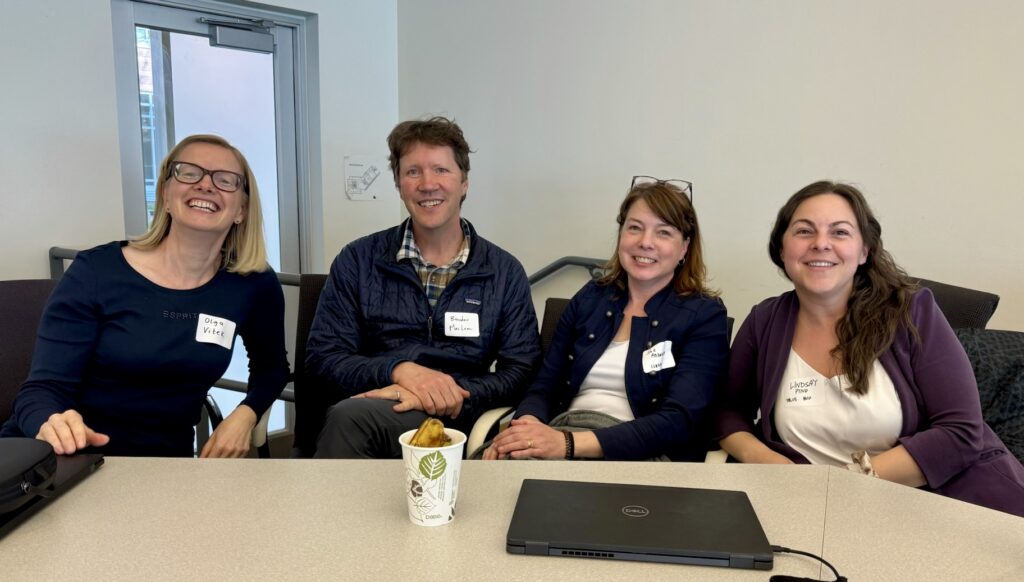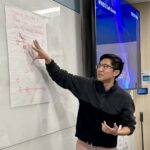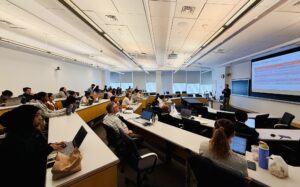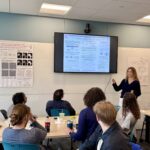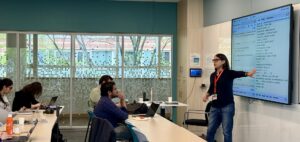Speakers
April 27 – May 9, 2026, Northeastern University, Boston MA in person
Organizers: Olga Vitek
Sponsors: Fragmatics, Biognosys, and Barnett Institute for Chemical and Biological Analysis, Northeastern University
Note: speakers may change without notice.
Susan Abbatiello |
|
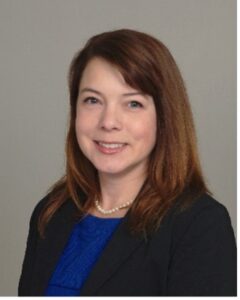 |
Susan received a Ph.D. in analytical chemistry at the University of Florida and completed a postdoc at the University of Pittsburgh’s Hillman Cancer Center. Susan is currently a Senior Principal Scientist in the Global Research Organization at Waters Corporation. Her previous experience includes managing the MS Core Facility at Northeastern University, FAIMS Product Manager at Thermo Fisher Scientific, and Research Scientist at the Proteomics Platform of the Broad Institute of MIT and Harvard. Susan’s research focuses on the development of hardware and software workflows to streamline targeted quantitation of peptides and small molecules by LC-MS. |
Theodore Alexandrov |
|
 |
Theodore Alexandrov is an Assistant Professor in the Departments of Pharmacology and Bioengineering at the University of California, San Diego (UCSD). His mission is to develop technologies that decode biology and enable the development of novel therapies with single-cell precision. Previously, he was a research team leader at the European Molecular Biology Laboratory (EMBL), where he also established and directed the EMBL Metabolomics Core Facility. At UCSD, he leads a multidisciplinary team of scientists and software engineers focused on creating translational technologies for spatial and single-cell metabolomics (ateam.ucsd.edu). His team developed METASPACE, a cloud platform for spatial metabolomics used by thousands of researchers worldwide, and SpaceM, a high-throughput method for probing metabolism at single-cell resolution. |
Kylie Bemis |
|
 |
Kylie is Assistant Teaching Professor in the Khoury College of Computer Sciences at Northeastern University. She holds a B.S. degree in Statistics and Mathematics, a M.S. degree in Applied Statistics, and a Ph.D. in Statistics from Purdue University. In 2013, she interned at the Canary Center at Stanford for Cancer Early Detection, where she developed the Cardinal software package for statistical analysis of mass spectrometry imaging experiments. In 2015, she was awarded the John M. Chambers Statistical Software Award by the American Statistical Association for her work on Cardinal. In 2016, she joined the Olga Vitek lab for Statistical Methods for Studies of Biomolecular Systems at Northeastern University as a postdoctoral fellow. In 2019, she joined Northeastern as faculty, where she now teaches data science and develops curriculum for the M.S. in Data Science program. Her research interests include machine learning and large-scale statistical computing for bioinformatics. |
Ryan Benz |
|
 |
Ryan is a Data Scientist at Seer, working in the fields of Bioinformatics and Proteomics. He holds a Ph.D. in Chemistry from the Univeristy of California, Irvine. Prior to joining Seer, Ryan worked at Applied Proteomics as a Bioinformatics Scientist working on a wide range of Proteomics-based biomarker discovery projects and blood-based tests for cancer. Ryan is an avid R user with over 15 years of experience, and is a certified RStudio trainer. |
Arzu Tuğçe Güler |
|
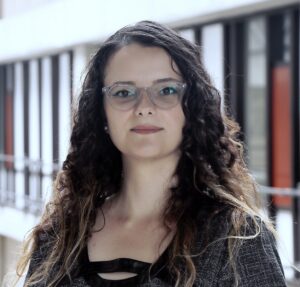 |
Arzu Tuğçe Güler is a Research Scientist at the Institute for Experiential AI at Northeastern University and an affiliate scientist at Boston Children’s Hospital/Harvard Medical School. Her current research focuses on advancing AI applications in mass spectrometry-based metabolomics and multi-omics integration for biological and medical research. She holds a B.S. in Computer Engineering from TOBB University of Economics and Technology (TOBB ETU) in Ankara, Turkey. She completed her M.Sc. in Bioinformatics at KU Leuven in Belgium and pursued her Ph.D. at Leiden University Medical Center in the Netherlands, working on automating mass spectrometry-based proteomics data analysis. Before joining the Experiential AI institute, she conducted postdoctoral research at Amsterdam UMC, studying proteomics and metabolomics changes in Huntington’s Disease. Her research interests include AI-driven omics analysis, bioinformatics for neurodegenerative diseases, and data integration. |
Benjamin Gyori |
|
 |
Ben is Associate professor in the Khoury College of Computer Sciences at Northeastern University. His research combines computational modeling, machine learning, natural language processing, and human–machine interaction to improve our understanding of human biology. Ben’s lab creates computational frameworks that combine high-throughput data with the biological mechanisms that govern health. Since joining Khoury College in 2023, Ben has been leading several research projects focused on artificial intelligence approaches to complex systems modeling, biomedical data integration, and accelerating vaccine development. Ben is a recipient of a DARPA Young Faculty Award, the DARPA Director’s Fellowship Award, is supported by DARPA, DTRA, and the Chan-Zuckerberg Initiative. He is an advocate for open science and open-source scientific software. |
Ed Huttlin |
|
 |
Ed Huttlin is an Instructor in the Department of Cell Biology at Harvard Medical School, where he oversees the BioPlex project – a longstanding effort to profile protein-protein interactions in human cells via affinity-purification mass spectrometry – as co-Principal Investigator along with Professors Steve Gygi and Wade Harper. In this capacity, Ed is responsible for all aspects of quality control, data analysis, and dissemination.
Although his recent work is heavily computational, Ed earned his PhD in Biochemistry at the University of Wisconsin, Madison, working in the lab of Professor Michael Sussman on quantitative proteomics applications of in vivo 15N metabolic labeling in organisms ranging from Arabidopsis to mice. He then joined the lab of Steve Gygi at Harvard where he has participated in development of isobaric labeling technology and led an effort to profile protein expression and phosphorylation across nine mouse tissues prior to assuming responsibility for the BioPlex project.
|
Wengong Jin |
|
 |
Wengong Jin is an assistant professor at Khoury College of Computer Sciences at Northeastern University. He obtained his PhD from MIT EECS in 2021. His research focuses on generative AI and agentic AI methods for drug discovery and biology. His work has been published in journals including ICML, NeurIPS, ICLR, Nature, Science, Cell, and PNAS, and covered by such outlets as the Guardian, BBC News, CBS Boston, and the Financial Times. He is the recipient of the BroadIgnite Award, Dimitris N. Chorafas Prize, and MIT EECS Outstanding Thesis Award. |
Devon Kohler |
|
 |
Devon is a PhD student at Northeastern University’s Khoury College of Computer Science in Olga Vitek’s lab. His research interests are in developing computational methods for mass spectrometry (MS)-based proteomics, specifically focused on the application of statistical and causal inference techniques. He is one of the lead developers of the MSstats family of R packages. He is the creator of a number packages, including MSstatsPTM and MSstatsLiP packages, as well as the R shiny-based GUI MSstatsShiny. He is currently researching applications of causal inference to biochemical systems; leveraging observational MS-based proteomics data and estimating the effect of perturbations on the downstream system. |
Michelle Li |
|
 |
Coming Soon |
Brendan MacLean |
|
 |
Brendan worked at Microsoft for 8 years in the 1990s where he was a lead developer and development manager for the Visual C++/Developer Studio Project. Since leaving Microsoft, Brendan has been the Vice President of Engineering for Westside Corporation, Director of Engineering for BEA Systems, Inc., Sr. Software Engineer at the Fred Hutchinson Cancer Research Center, and a founding partner of LabKey Software. In this last position he was one of the key programmers responsible for the Computational Proteomics Analysis System (CPAS), made significant contributions to the development of X!Tandem and the Trans Proteomic Pipeline, and created the LabKey Enterprise Pipeline. Since August, 2008 he has worked as a Sr. Software Engineer within the MacCoss lab and been responsible for all aspects of design, development and support in creating the Skyline Targeted Proteomics Environment and its growing worldwide user community. Brendan was the inaugural recipient of the 2016 Gilbert S. Omenn Computational Proteomics Award of the US Human Proteome Organization |
Alexey Nesvizhskii |
|
 |
Professor Alexey Nesvizhskii is the Godfrey Dorr Stobbe Professor of Bioinformatics at the University of Michigan, Ann Arbor, and the Founder of Fragmatics. His research focuses on mass spectrometry-based proteomics and proteogenomics, bioinformatics, and multi-omics data integration. The computational algorithms and software tools developed by Prof. Nesvizhskii and his group are used by thousands of laboratories worldwide. |
Monika Pepelnjak |
|
 |
Biography coming soon. |
Lindsay Pino |
|
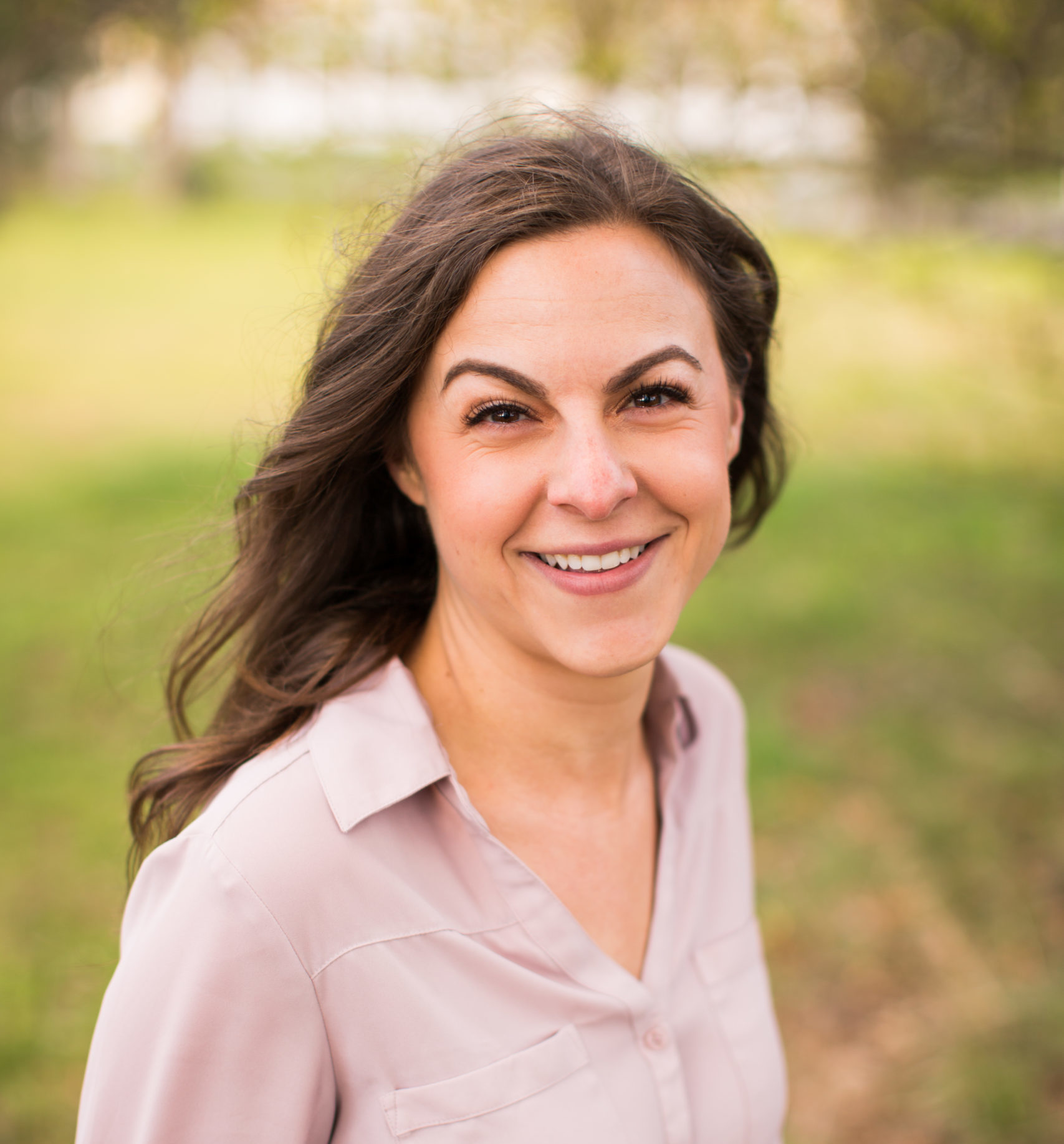 |
Lindsay is the co-founder and CTO of Talus Bio. She leads the development of Talus’s screening platform, guiding and coordinating scientific efforts across automated proteomics sample preparation and high-throughput mass spectrometry data acquisition and analysis. She has built and leads a team of multi-disciplinary scientists encompassing the breadth of scientific work at Talus, including chemical biologists, protein chemists, and computational biologists. Lindsay holds a Ph.D. from the University of Washington’s Department of Genome Sciences in the MacCoss lab. Prior to that, she worked at the Broad Institute of MIT and Harvard. |
Brian Searle |
|
 |
Brian Searle is a Career Scientist in the Division of Computational Biology at Mayo Clinic, where his lab develops bioinformatics and proteomics technologies. He holds a B.A. in Chemistry from Reed College and a Ph.D. from the University of Washington. Brian co-founded Proteome Software, where he designed Scaffold, the industry-standard software for interpreting proteomics data, and has developed other widely-used tools including EncyclopeDIA and Thesaurus. |
Romi Singh |
|
 |
Dr. Romi Singh is an expert in global drug development and the application of AI in regulatory science. A former executive at Pfizer, Amgen, Merck, and GSK, he now serves as a Professor of Practice at Northeastern University and founder of GRA Advisors. His experience spans the full lifecycle of biopharmaceutical development–from drug discovery to global registration. He obtained his undergraduate degree from St. Stephen’s College, a doctorate from the University of Kansas, and a postdoctoral fellowship from the University of Washington, with certification from MIT in AI and Business Strategy. |
Olga Vitek |
|
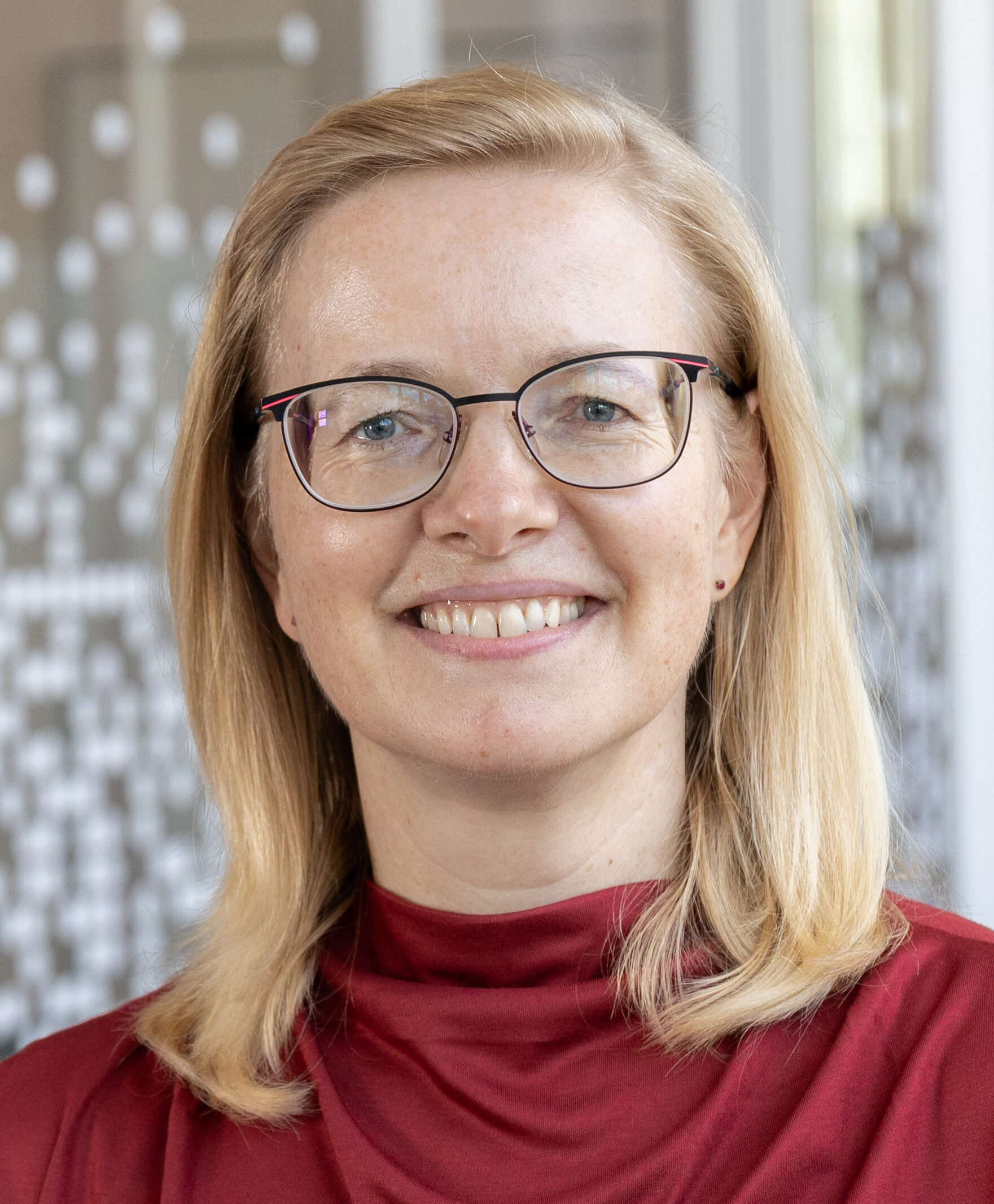 |
Olga is Professor in the Khoury College of Computer Sciences at Northeastern University, and was previously a Faculty and a University Faculty Scholar at Purdue. She holds a PhD in Statistics from Purdue University. Her research intersects statistical science, machine learning, mass spectrometry and systems biology. Statistical methods and open-source software MSstats and Cardinal developed in her lab are widely used in academia and industry. Olga is an elected Fellow of the American Statistical Association, a recipient of the 2021 Gilbert S. Omenn Computational Proteomics Award of the US Human Proteome Organization, and of the Indigo BioAutomation Females in Mass Spectrometry Distinguished Contribution Award. She is a recipient of the CAREER award of the National Science Foundation, and of the Essential Open-source Software Award of the Chan-Zuckerberg foundation. |
Fengchao Yu |
|
 |
Dr. Fengchao Yu is a Research Assistant Professor at the University of Michigan, with expertise in peptide identification and quantification, post-translational modification (PTM) analysis, and data-independent acquisition (DIA) proteomics. He is the developer and maintainer of several widely adopted computational tools, including FragPipe, MSFragger, IonQuant, MSBooster, and diaTracer. |
Administrative Support
Roger Donaghy |
|
 |
Web Developer Northeastern University |
Samry Hehn |
|
 |
|
Ethan Rogers |
|
 |
Doctoral Student in the Vitek Lab Northeastern University |

